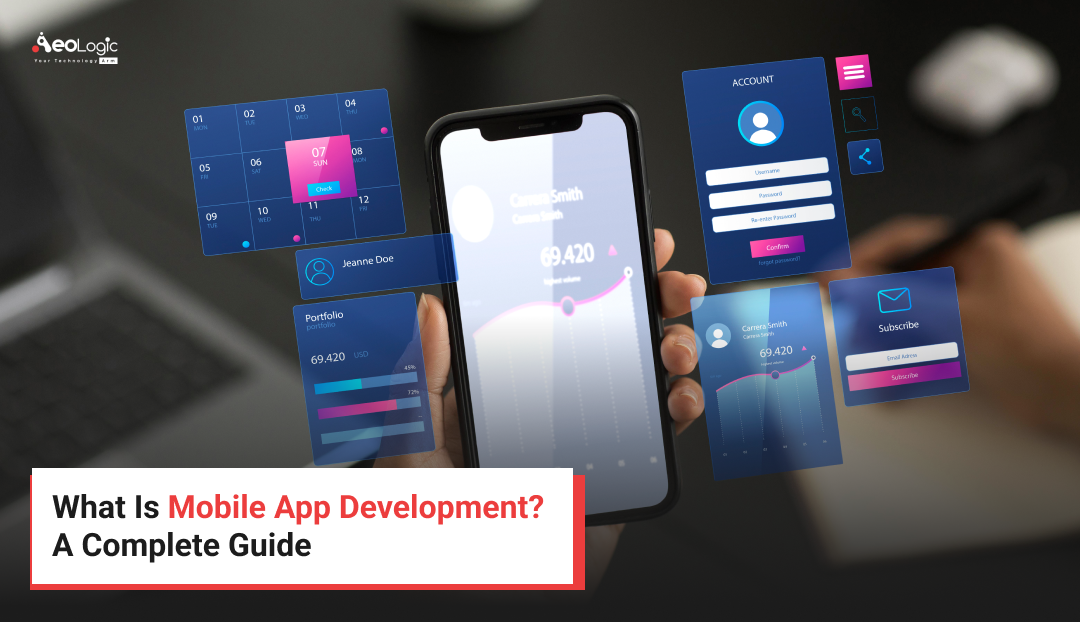When we think about our phone, we mostly think about the apps we use every day — WhatsApp, Instagram, YouTube, Zomato, and all those small tools that make life easy. But not many people stop and think how these apps are made or who makes them. That whole process of making an app is called mobile app development.
In simple words, mobile app development is the work of building apps that run on your phone or tablet. It’s not only about writing code. It starts from an idea, designing the screens, building the app, testing it, and finally uploading it on the Play Store or App Store so people can download it.
When I first heard the word “app development,” I thought it was something only big tech people do. But actually, anyone with interest and practice can learn it. There are many free tools now that make the process much easier than before.
Apps are everywhere — for ordering food, watching videos, playing games, learning, and even booking tickets. Every company now wants its own app because people spend most of their time on mobile phones.
So, in this blog, I will try to explain in simple words what mobile app development is, how it works, what kinds of apps exist, and how it is useful in today’s world.
What Is Mobile App Development
Mobile app development simply means making software that can work on a mobile phone. These apps can be games, shopping apps, social media apps, banking apps, or any other kind of app you use on your phone.
When developers make these apps, they use special computer languages depending on the platform. For example:
-
Android uses Java or Kotlin.
-
iPhones use Swift or Objective-C.
But mobile app development is not only coding. It includes planning, drawing layouts, deciding how buttons look, testing it again and again, and then keeping it updated.
You can say it’s like building a house — coding is just one part, but you also need design, paint, furniture, and maintenance.
Why Mobile App Development Is Important
Look around — everyone is using phones. People check their phones more than 100 times a day. Apps help them do small and big things easily. That’s why app development is a big deal now.
Here are a few reasons why mobile apps are important today:
-
People use apps more than websites – Most online traffic now comes from mobile phones.
-
Easy to access – Apps stay right on the phone’s home screen. You just tap and it opens.
-
Good for business – Companies can reach customers directly through apps.
-
Better experience – Apps work smoother than websites and can also work offline.
-
Growing career – Many young people are now learning app development because it has good job scope.
How Mobile App Development Works
The process of building an app looks long, but if we break it down, it’s quite simple.
Idea and Planning
Every app starts with an idea — like, “I want to make an app to order food.” Then the team plans what the app will do and how it will look.
Designing
Designers create screens and buttons. This part is called UI and UX design. It decides how the app looks and how people will use it easily.
Development
Developers write the actual code. They connect the buttons, data, and features together.
Testing
Before the app is released, it is tested on different phones to find and fix any problems.
Launching
After testing, it’s published on app stores so users can download it.
Updates and Maintenance
Once the app is live, developers keep improving it by fixing bugs and adding new features.
So it’s not just making an app once — it’s a continuous process of improvement.
Types of Mobile Apps
When I first started reading about apps, I didn’t know that there were different kinds. I thought all apps were the same. Later I found out that there are a few main types, and each one is made in a slightly different way.
Native Apps
Native apps are made for a single type of phone system. For example, one version for Android and another for iPhones.
-
Android apps use Java or Kotlin.
-
iPhone apps use Swift or Objective-C.
They work really fast because they are made only for that system. They can use the phone’s camera, GPS, contacts, and other features directly.
Example: Instagram, WhatsApp, Spotify.
The only problem is that if you want both Android and iPhone versions, you have to make two separate apps. That takes extra time and money.
Hybrid Apps
These are a mix of web and native apps. Developers build them using website codes like HTML, CSS, and JavaScript, and then wrap them so they can run like real apps on your phone.
The good thing is you can use the same code for Android and iPhone. The bad thing is they can be a little slower.
Example: Twitter and Uber started as hybrid apps.
Web Apps
Web apps open inside your phone’s browser — like Chrome or Safari — not from the app store. They look like normal apps but run completely online.
Example: Gmail and Google Docs.
They’re easier and cheaper to make but can’t use all phone features like a native app.
Progressive Web Apps (PWAs)
These are newer versions of web apps that can work offline and be added to your home screen like a normal app.
Example: Pinterest and Starbucks.
PWAs are great for businesses that just need a simple app without spending too much money.
Platforms for Mobile Apps
When someone builds an app, they have to choose where it will run. The main two platforms are Android and iOS.
Android
Android is made by Google. It’s the most common mobile system in the world. Apps for Android are created in Java or Kotlin using a tool called Android Studio.
Good things about Android:
-
Works on many phone brands (Samsung, OnePlus, Xiaomi etc.)
-
Easier for beginners to start developing
-
Reaches a big audience
iOS
iOS is made by Apple and works on iPhones and iPads. Apps are written in Swift or Objective-C using a tool called Xcode.
Good things about iOS:
-
Very smooth performance
-
Strong security
-
Users spend more money on apps
Both platforms are important. Android reaches more people, while iOS apps often earn more money. That’s why many developers try to make one app that works on both using “cross-platform” tools.
Tools and Languages Used
Here are some common tools people use when making apps:
Android: Java, Kotlin, Android Studio
iOS: Swift, Objective-C, Xcode
Both (Cross-Platform): Flutter, React Native, Ionic
These tools help build apps faster and fix problems easily. Flutter and React Native are popular now because you can write one set of code and use it everywhere.
Real-Life Examples of App Development
Let’s look at a few examples so it feels more real.
Food Delivery Apps
Apps like Zomato and Swiggy let you order food from your phone. Developers worked on many parts — menus, payments, delivery tracking, and even customer chat.
Shopping Apps
Amazon and Flipkart handle thousands of products and payments every day. Without good app developers, those systems wouldn’t run smoothly.
Banking Apps
Today, people can transfer money and pay bills without going to a bank. That’s all because of strong mobile app systems.
Education Apps
Byju’s and Duolingo help students learn from anywhere. Developers built features like progress tracking and quizzes.
Fitness Apps
Fitbit and Nike Run Club use mobile sensors to count steps, calories, and heart rate — showing how apps can mix health and technology.
Benefits of Mobile App Development
Mobile apps are not just popular because they look good; they make life easier for both people and businesses. These are some of the main reasons why mobile app development is so important today.
Easy to Reach Customers
When a company has its own app, it can stay connected with customers all the time. The app sits right on the phone’s screen, so it’s easy to access. Businesses can send offers, updates, and messages directly through the app.
Works Faster Than Websites
Most apps load faster and run smoother than websites. People don’t like waiting, so fast apps help keep users happy.
Offline Access
Some apps work even without the internet. For example, note apps or game apps that can be used offline. This helps people use them anytime they want.
Builds Stronger Brand Image
Having a good mobile app makes a company look modern and professional. It shows that the business is serious about providing a better experience for its customers.
Personalized Experience
Apps can remember what users like. Based on that, they can show related products, videos, or information. It makes people feel special and keeps them coming back.
Direct Feedback
Through apps, users can give feedback easily. Businesses can use that feedback to improve their service or fix small issues quickly.
Better Sales
Mobile apps have made buying and selling easier than ever. One-click payment, easy navigation, and secure transactions help boost sales.
Great for Marketing
Companies can promote their new products or offers through app notifications instead of spending a lot on ads. It’s direct and effective.
Challenges in Mobile App Development
While developing apps looks exciting, there are also many problems developers face behind the scenes. Here are some common ones.
So Many Devices
There are hundreds of phone models with different screen sizes and versions. Making sure the app works perfectly on all of them is tough.
Cost
A good app takes time, effort, and money. Small businesses sometimes struggle to afford a high-quality app.
Security Issues
Apps that deal with personal or financial data must be safe. If not handled carefully, hackers can target them.
User Retention
Many people download apps and delete them after a few days. So keeping users interested is a big challenge.
Frequent Updates
Phones keep changing, and users expect new features all the time. Developers have to keep updating their apps to stay relevant.
Competition
There are millions of apps on the Play Store and App Store. Getting noticed among them is not easy.
Industries That Depend on Mobile Apps
Mobile apps are not limited to one area. Almost every business now uses them. Let’s look at where they are most useful.
E-Commerce and Shopping
Online stores like Amazon and Flipkart use mobile apps so people can shop easily. Customers can browse, compare, and pay all in one place.
Banking and Finance
Apps have made banking simple. People can send money, pay bills, and check accounts anytime without visiting the branch.
Education
Schools, colleges, and online learning platforms like Byju’s or Udemy use apps to teach students anywhere.
Healthcare
Many hospitals now have apps for appointments and reports. Fitness apps also help people track steps and health goals.
Food Delivery
Apps like Zomato and Swiggy have changed how we eat. You can order from any restaurant and watch your delivery live on the app.
Travel and Transport
Apps like Uber, Ola, and MakeMyTrip help book cabs, flights, and hotels in minutes.
Entertainment
YouTube, Netflix, and Hotstar let users stream videos anytime. Gaming apps are another huge part of this industry.
Government Services
Many government departments now have apps for tax filing, ticket booking, or ID verification.
Real Estate
Property apps help people find houses to rent or buy without visiting each one physically.
Agriculture
Some farming apps help farmers check weather reports, market prices, and farming tips.
The Future of Mobile App Development
Mobile apps are not going anywhere. In fact, they’re getting bigger every year. People now use apps for almost everything — ordering food, watching movies, paying bills, or learning new things. Because of that, companies and developers are always trying new ideas.
Here’s what the future of mobile app development might look like in simple words:
Apps Will Get Smarter
Future apps won’t just show information — they’ll learn from what you do and suggest things automatically. For example, a shopping app might suggest clothes based on your previous orders or a music app might play songs you usually like.
More Use of Voice and Touchless Control
People are using voice commands more these days. Soon, apps will work through voice and gestures instead of just touch.
5G Will Change Everything
With 5G networks getting faster, apps will be able to load instantly and handle more features like live videos and virtual tours.
Internet of Things (IoT)
Apps will connect with more smart devices around us — like cars, watches, home appliances, and even health gadgets.
Better Security
People care a lot about data safety now. Developers will focus more on making apps that protect user data and privacy.
Augmented Reality and Virtual Reality
Games and shopping apps will start using AR and VR to make the experience more real. You’ll be able to try clothes or see how a sofa looks in your room before buying.
Cross-Platform Apps
Instead of building separate apps for Android and iOS, most developers will make one app that works on both using Flutter or React Native.
In short, mobile apps will get smarter, faster, and more connected to our everyday lives.
Frequently Asked Questions (FAQs)
1. What does mobile app development mean?
It means creating software that works on mobile phones and tablets. These apps help people do different tasks like shopping, learning, or entertainment.
2. Is it hard to learn mobile app development?
At first, it feels a bit confusing, but once you practice with tools like Flutter or Android Studio, it gets easier. Many people learn it through YouTube and free courses.
3. What skills do you need for making apps?
You need basic knowledge of coding languages like Java, Kotlin, or Swift, and a bit of design sense to make the app look good and easy to use.
4. How long does it take to make an app?
A simple app might take a few weeks, but a big app with many features can take a few months or even longer.
5. Which is better — Android or iOS development?
Both are good. Android has a larger user base, while iOS users spend more money on apps. Most developers try to build for both.
6. Do apps need updates?
Yes, apps need regular updates to fix bugs and add new features because phones and software keep changing.
7. How much does it cost to build an app?
It depends on what the app does. A small app can cost a few hundred dollars, while a big e-commerce or gaming app can cost thousands.
Conclusion
Now you probably understand clearly what is mobile app development and why it has become so important. Every app we use daily — from shopping to chatting — is a result of someone’s idea and hard work turned into a mobile application.
Mobile apps have completely changed how businesses and people connect. For users, apps bring convenience and comfort. For businesses, they create more sales and customer loyalty.
Developing an app is not a one-time thing. It’s an ongoing journey of building, testing, and updating. It needs patience and creativity, but it’s also a field full of possibilities.
The future will bring even smarter apps that understand us better and help us more. So whether you’re a business owner thinking of making an app or a student interested in learning it, this is the right time to start.
Every big app once started with a small idea — maybe the next big one can be yours.
Accelerate enterprise mobility transformation with a mobile application development company Noida experienced in building compliant, high-performance applications for large organizations and distributed teams.

Passionate about breaking down complex tech into simple ideas. Covers everything from AI and software development to gadgets and emerging tech trends.






